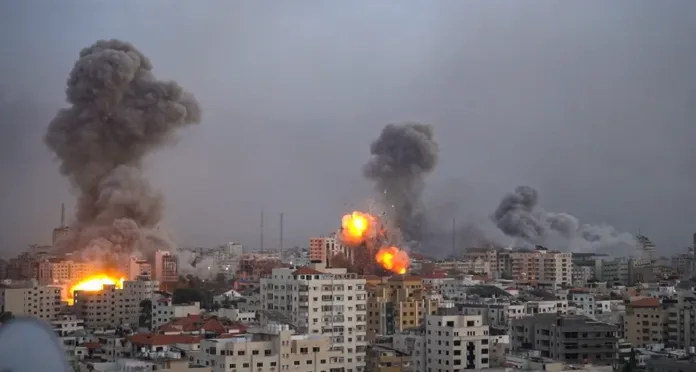Israeli strikes in western Syria kill one amid tense indirect talks aiming to reduce conflict
Israeli airstrikes struck targets in western Syria on Friday, killing one civilian and raising tensions despite recent diplomatic efforts to ease hostilities between the long-standing foes. This marked the first reported Israeli attack on Syrian soil in nearly a month, occurring shortly after Damascus and Israel announced indirect talks aimed at reducing conflict. The United States also called for a “non-aggression agreement” between the two nations, which have remained technically at war since 1948.
State television in Syria reported that Israeli jets targeted sites near the village of Zama in the Jableh countryside, south of Latakia province. The Syrian news agency Sana confirmed that one civilian died as a result of the airstrike in the vicinity of Zama. Meanwhile, the Israeli military stated that its strikes focused on weapon storage facilities housing coastal missiles that it said posed a threat to maritime freedom of navigation in the Mediterranean.
In a statement, Israel’s military claimed it also targeted components of surface-to-air missile systems in the Latakia area. It vowed to continue operations to “maintain freedom of action in the region” and to neutralise any threats to the state of Israel and its citizens. The military’s posture reflects Israel’s longstanding strategy of preventing advanced weaponry from reaching Syrian forces or their allies, which Israel views as a security risk.
The Syrian Observatory for Human Rights, a UK-based war monitor, reported that jets believed to be Israeli also struck military sites on the outskirts of Tartus and Latakia. These areas have been frequent targets of Israeli strikes in recent years, as Israel seeks to curb the military capabilities of Syria’s government and allied groups.
Syria and Israel have technically remained at war since Israel’s establishment in 1948. The conflict intensified when Israel seized the Golan Heights from Syria in the 1967 Six-Day War—a territory still internationally disputed and a flashpoint for military clashes. Since the fall of Bashar al-Assad’s regime in December, Israeli airstrikes have surged, with hundreds of raids targeting weapon depots and military installations. Israel justifies these operations as necessary to prevent advanced arms from empowering Syrian government forces or extremist factions, whom it labels jihadists.
The timing of this latest strike is significant. Just weeks ago, Damascus announced indirect talks with Israel to calm regional tensions, and Washington has urged both sides to pursue a formal “non-aggression agreement.” Despite these efforts, the Israeli air force continues its campaign, underscoring the fragile and volatile nature of peace prospects in the region.
The death of a civilian in the latest strike highlights the tragic human cost of this protracted conflict. Civilians in western Syria, particularly near military installations, remain at high risk amid ongoing military operations. The repeated Israeli strikes in these areas exacerbate fears of wider escalation, even as diplomatic channels open.
The future of Israeli-Syrian relations remains uncertain. While indirect negotiations offer a sliver of hope, decades of mistrust and unresolved territorial disputes continue to fuel hostility. The persistent cycle of airstrikes and retaliations risks undermining any progress made towards peace and stability in the region.
